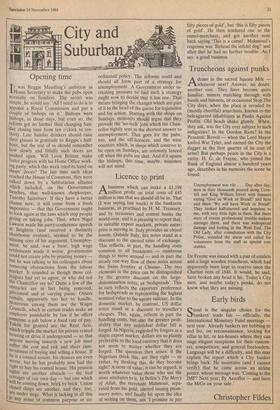Licence to print
Abusiness which can make a £1,198 million profit on total costs of £45 million is one that we should all be in. That (I was saying last week) is the banknote business, as practised by H. M. Treasury, and by treasuries and central banks the world over, and it is pleasing to report that, in suitable export markets, private enter- prise is moving in. Italy provides an object lesson. Outside Italy, lira notes stand at a discount to the quoted rates of exchange. This reflects, in part, the handling costs common to all banknotes — cumbrous things to move around — and in part the steady one-way flow of these notes across the Swiss frontier at Chiasso. The two elements in the price can be distinguished by the greater discount on the large- denomination notes, or 'bedspreads'. This in turn reflects the exporters' preference for bedspreads as representing the highest nominal value to the square suitcase. In the domestic market, by contrast, US dollar notes stand at a discount to traveller's cheques. This, again, reflects in part the handling costs, but also the greater prob- ability that any individual dollar bill is forged. In Nigeria, regarded by forgers as a staple export market, dollars are so plainly preferable to the local currency that it does not seem to matter whether they are forged. The question then arises: if the Nigerians think this, are they right — or rather, by thinking this, do they become right? A store of value, it can be argued, is worth whatever value those who use the store attributes to it. In Belloc's The Mercy of Allah, the merchant Mahmous, sepa- rated from his gold, started issuing prom- issory notes, and finally hit upon the idea of writing on them, not 'I promise to pay fifty pieces of gold', but 'this is fifty pieces of gold'. He then tendered one to the camel-merchant, and got another note back saying 'This is a camel'. Mahmoud's response was 'Behead the infidel dog!' and after that he had no further trouble. As I say, a good business.






















































 Previous page
Previous page